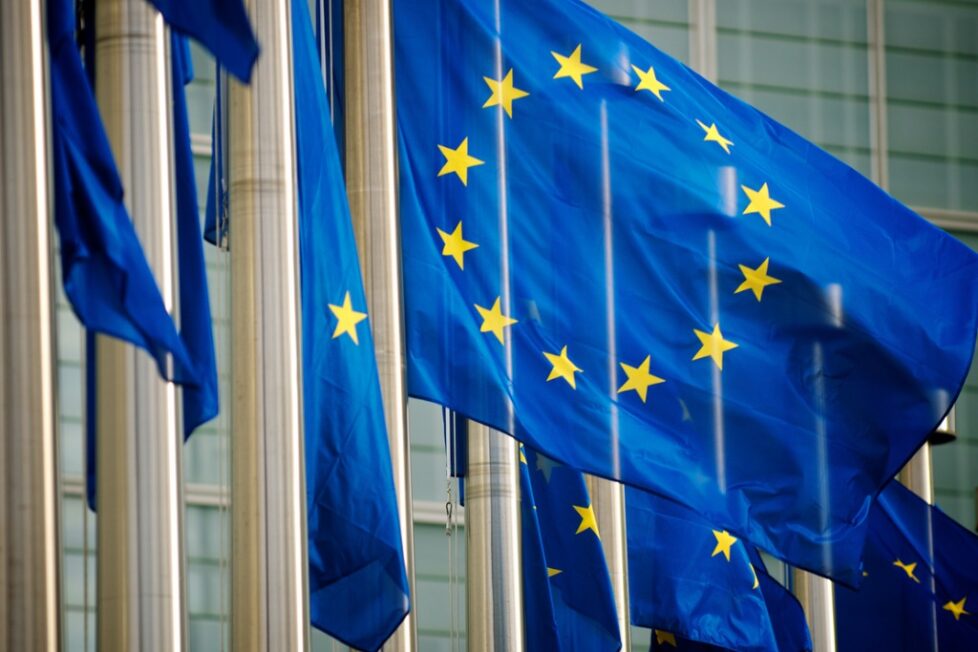EU Adopts Laws to Double Renewable Energy Share, Decarbonize Aviation

The European Council today announced the adoption of two pieces of legislation today, including a directive to nearly double the share of renewable energy consumption in the EU by 2030, and a law aimed at decarbonizing the aviation sector by accelerating the adoption of sustainable aviation fuel (SAF).
The Council’s adoption of the new rules marks the last major step in the completion of two of the final pieces of the European Commission’s “Fit for 55” roadmap – the EU’s proposed strategy to cut greenhouse gas (GHG) emissions by 55% by 2030, compared to 1990 levels.
Following the EU Council’s announcements, EU Commission President Ursula von der Leyen said:
“The European Green Deal is delivering the change we need to reduce CO² emissions. It does so while keeping the interests of our citizens in mind, and providing opportunities for our European industry. The legislation to reduce our greenhouse gas emissions by at least 55% by 2030 is now in place, and I am very happy that we are even on track to overshoot this ambition.”
One of the key pieces of legislation adopted by Council included the Renewables Energy Directive, which mandates that renewable energy make up 42.5% of the EU’s overall energy consumption by 2030, while also directing EU Member States to endeavor to collectively achieve an indicative renewable energy target of 45%. Renewable energy accounted for approximately 22% of the EU energy mix in 2021.
The legislation significantly raises the EU’s renewable energy goal from its current 2030 target of 32%, and even above the initial 40% goal proposed by the European Commission’s “Fit for 55” roadmap, the EU’s proposed strategy to cut greenhouse gas (GHG) emissions by 55% by 2030, compared to 1990 levels. That target was raised to the 45% goal in May 2022 with the EU’s REPowerEU Plan, as part of the strategy to rapidly reduce reliance on Russian fossil fuels in response to the Russian invasion of Ukraine.
The Renewable Energy Directive also includes a series of sector-specific sub-targets aimed at accelerating the adoption of renewables in industries in which adoption has been slower, including transport, industry, buildings and district heating and cooling. Sector targets under the legislation include reaching at least a 49% renewable energy share in buildings by 2030, as well as measures to gradually increase renewable targets for cooling and heating, a 14.5% reduction in transport sector emissions by 2030 through increased renewables deployment, requirements for industry to increase the use of renewable energy annually by 1.6% and for 42% of the hydrogen used in industry to come from renewable fuels of non-biological origin (RFNBOs) by 2030, and 60% by 2035.
Teresa Ribera, Spanish acting Minister for the Ecological Transition, said:
“This is a great achievement in the framework of the ´Fit for 55´package which will help reaching the EU’s climate goal of reducing EU emissions by at least 55% by 2030. It is a step forward which will contribute to reach the EU´s climate targets in a fair, cost-effective and competitive way.”
The Council also adopted the “ReFuelEU aviation” law, aimed at increasing both the demand and supply of sustainable aviation fuel, with rules including minimum blends of SAF for fuel suppliers, as well as requirements for aircraft operators and airports.
Fuel accounts for the vast majority of the aviation sector’s emissions. Generally produced from sustainable resources, like waste oils and agricultural residues, SAF is seen as one of the key tools to help decarbonize the aviation industry in the near- to medium-term. SAF producers estimate the fuels can result in lifecycle GHG emissions reductions of as much as 85% relative to conventional fuels. Efforts to meaningfully increase the use of SAF by airlines face significant challenges, however, including the low supply currently available on the market, and prices well above those of conventional fossil-based fuels.
For aviation fuel suppliers, the new rules will require a minimum share of SAF at EU airports, starting a 2% in 2025, and increasing over time to reach 70% by 2050, as well as a minimum share of synthetic fuels starting in 2030 and also increasing through 2050.
Rules for aircraft operators include a requirement for flights departing EU airports to refuel only with the fuel necessary for the flight, and to ensure that the yearly amount of aviation fuel uplifted at EU airports is equal to at least 90% of the yearly aviation fuel required. According to the European Council, the rules are aimed at avoiding emissions related to extra weight from unnecessary fuel, and to avoid carbon leakage through “tankering,” in which airlines would deliberately carry excess fuel to avoid refueling at airports with higher SAF requirements.
The new law also requires the creation of a labelling scheme about aircraft operators’ environmentalEnvironmental criteria consider how a company performs as a steward of nature. More performance using SAF, aimed at enabling consumers to make informed choices and at promoting greener flights. Several airlines have been accused or charged with greenwashing over unclear or misleading SAF-related claims over the past few months.
Raquel Sánchez Jiménez, Spanish acting minister of transport, mobility and urban agenda, said:
“The new law will provide legal certainty to aircraft operators and fuel suppliers in Europe. By kick-starting the large-scale production of sustainable aviation fuels, it will soon make the EU’s aviation sector much greener. This is a key step in our broader effort to reach our climate targets at European and global level.”
With the Council’s adoption, the new laws will now be published in the EU’s Official Journal for subsequent entry into force.
Von der Leyen added:
“This is an important sign to Europe and to our global partners that the green transition is possible, that Europe is delivering on its promises.”